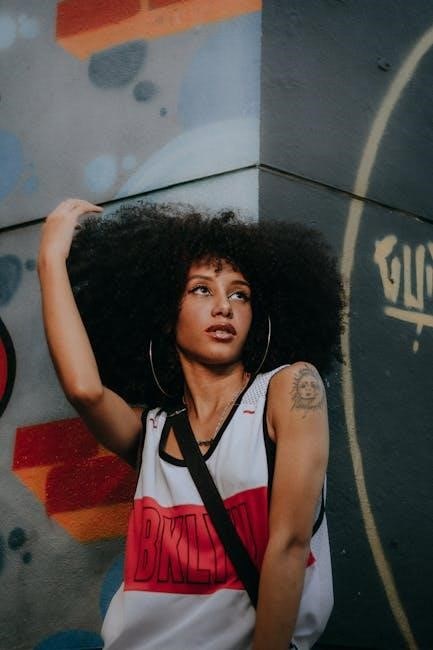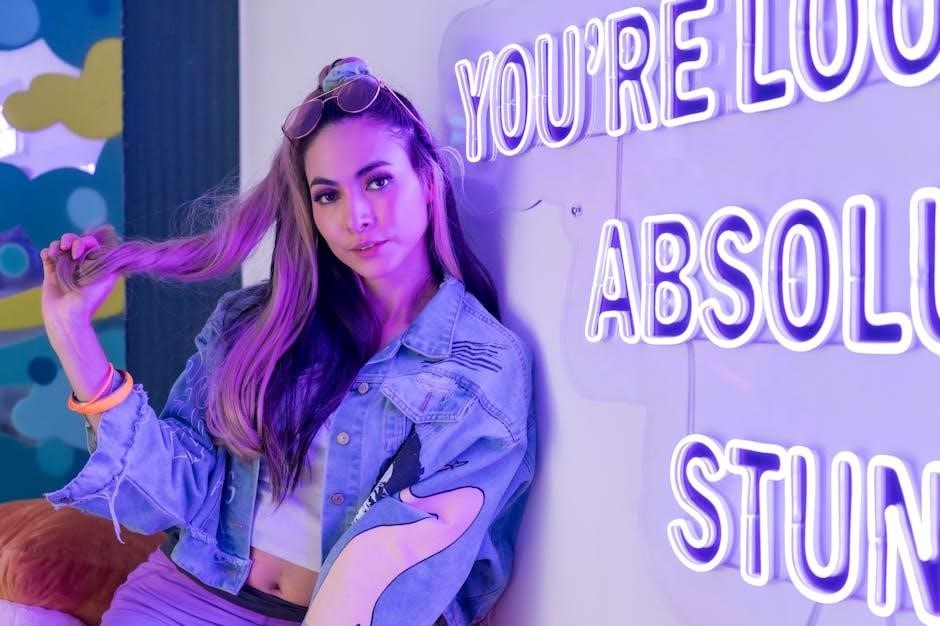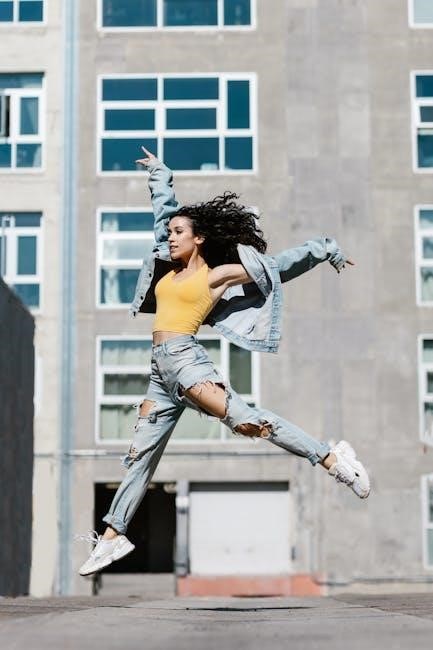Female hip-hop artists have reshaped the music industry, breaking barriers and challenging gender norms. Their contributions, from pioneering rap to modern chart-toppers, highlight resilience, creativity, and cultural impact.
1.1 Historical Significance of Women in Hip Hop Culture
Women have played a pivotal role in shaping hip-hop culture since its inception. Pioneers like MC Sha-Rock, Roxanne Shanté, and MC Lyte broke barriers, challenging sexism and redefining artistic expression. Their contributions laid the groundwork for future generations, proving women’s integral role in hip-hop’s evolution and cultural impact. Their legacy continues to inspire and empower artists globally. Essential reading for understanding this history is available in books like “Hip Hop Harem” and “The Her Hip Hop Experience,” which detail their journeys and influence.
1.2 The Importance of Documenting Female Hip Hop Artists
Documenting female hip-hop artists is crucial for preserving their contributions to culture, music, and feminism. Their stories challenge stereotypes and highlight resilience, offering inspiration and role models. Books like Hip Hop Harem and academic studies provide essential insights, ensuring their legacies are recognized and celebrated. This documentation also underscores their influence on fashion, language, and social justice movements, cementing their historical significance.

Early Pioneers of Female Hip Hop
MC Sha-Rock, Roxanne Shanté, and MC Lyte were trailblazers, paving the way for future generations. Their innovative rhymes and bold performances laid the foundation for female rap.
2.1 MC Sha-Rock and the Founding Generation
MC Sha-Rock, hip-hop’s first female artist, emerged in the 1970s with the Funky 4 + 1. Her dynamic stage presence and lyrical prowess set the tone for future generations, proving women could thrive in the male-dominated genre. Her contributions remain celebrated as foundational to female hip-hop’s history and evolution;
2.2 Roxanne Shanté and the Golden Age of Hip Hop
Roxanne Shanté emerged as a trailblazer during hip-hop’s Golden Age, becoming one of the first female rappers to achieve widespread recognition. Her 1984 hit “Roxanne’s Revenge” showcased her sharp lyrical skills and fearless attitude, challenging male-dominated narratives. Shanté’s impact paved the way for future female artists, solidifying her legacy as a groundbreaking figure in hip-hop history.
2.3 MC Lyte and the Rise of Female Rap in the 80s
MC Lyte became a cornerstone of female rap in the 1980s, known for her powerful lyrics and commanding stage presence. Her 1988 album Lyte as a Rock was the first full-length rap album by a female artist, addressing themes of female empowerment and independence. Lyte’s influence helped define the role of women in hip-hop, setting a precedent for future generations.
Hip Hop Feminism and Its Influence
Hip-hop feminism emerged as a powerful movement, challenging misogyny and amplifying female voices. It reshaped narratives, fostering empowerment and inspiring future generations to reclaim their space in the industry.
3.1 The Concept of Hip Hop Feminism
Hip-hop feminism combines social justice and cultural critique, focusing on race, gender, and sexuality. It challenges systemic inequalities and amplifies marginalized voices, promoting female empowerment and redefining traditional norms within the hip-hop space, as explored in various academic works and artist narratives.
3.2 Lauryn Hill and The Miseducation of Lauryn Hill
Lauryn Hill’s album The Miseducation of Lauryn Hill is a landmark of hip-hop feminism, blending lyrical prowess with themes of identity, empowerment, and social justice. Her work challenges patriarchal norms, inspiring a wave of Black women artists to embrace authenticity and assert their voices in the industry.
3.3 Missy Elliott and Revolutionary Music Videos
Missy Elliott’s innovative music videos redefined visual storytelling in hip-hop. Her bold creativity, from “Get Ur Freak On” to “Lose Control,” showcased female empowerment and artistic experimentation. Elliott’s work not only elevated female representation but also set new standards for production quality and cultural impact in the genre.
Contemporary Female Hip Hop Artists
Contemporary female hip-hop artists are redefining the genre with powerful lyrics and cultural impact. Trailblazers like Cardi B and Megan Thee Stallion dominate charts, breaking barriers.
4.1 Cardi B and Megan Thee Stallion
Cardi B and Megan Thee Stallion are modern icons, blending bold personalities with lyrical prowess. Their chart-topping hits and unapologetic style have redefined female dominance in hip-hop, breaking cultural barriers and inspiring a new generation of artists. Their collaborations and individual successes highlight the evolution of women’s influence in the genre, solidifying their legacies as trailblazers.
4.2 The Rise of Tierra Whack and Rico Nasty
Tierra Whack and Rico Nasty represent a new wave of female hip-hop, blending genre-defying styles with bold creativity. Tierra’s innovative storytelling and visual artistry, while Rico’s punk-infused rap and raw energy, have captivated audiences. Their unique approaches challenge traditional norms, solidifying their roles as trailblazers and inspiring a fresh perspective on female artistry in hip-hop culture and beyond.

The Role of Women Beyond Performance
Women in hip-hop extend their influence beyond artistry, excelling as producers, DJs, and journalists. They shape the industry’s sound, culture, and narrative, driving innovation and inclusivity behind the scenes.
5.1 Female Producers, DJs, and Industry Executives
Women are making significant strides behind the scenes in hip-hop. Female producers like Missy Elliott and Trakgirl are crafting beats that define modern sounds. DJs such as DJ Spinderella and DJ Jazzy Joyce are renowned for their turntable skills, while executives like Sylvia Rhone and Debra Lee are reshaping the industry’s power dynamics, ensuring more equitable opportunities and fostering a culture of inclusion that celebrates diverse voices and perspectives, ultimately enriching hip-hop’s creative landscape.
5.2 The Impact of Female Hip Hop Journalists
Female hip-hop journalists are pivotal in shaping narratives and amplifying voices within the industry. Writers like Joan Morgan and Danyel Smith have championed authenticity, challenging stereotypes and offering nuanced perspectives on gender, race, and culture. Their work not only documents history but also empowers artists, fostering a more inclusive and equitable hip-hop ecosystem that values diverse storytelling and representation, ensuring that women’s contributions are both recognized and celebrated.
Intersectionality in Female Hip Hop
Intersectionality in female hip hop explores how race, class, and sexuality shape experiences, highlighting unique challenges and resilience while celebrating diverse identity and representation in the genre.
6.1 Race, Class, and Sexuality in Hip Hop
Race, class, and sexuality deeply intersect in female hip hop, influencing both personal and collective narratives. Black women, often at the genre’s core, face layered discrimination, while Latinx and queer artists challenge norms, blending cultural identity with social critique to create powerful, authentic voices that resonate globally and inspire change within the industry.
6.2 Queer and Trans Artists in Hip Hop
Queer and trans artists in hip hop challenge heteronormative norms through bold expressions of identity. Figures like Syd and others disidentify with mainstream norms, reclaiming space for diverse gender and sexual expressions. Their music and artistry foster inclusivity and visibility, breaking barriers and inspiring a more accepting future for LGBTQ+ voices within the genre.
Global Perspectives on Female Hip Hop Artists
Female hip hop artists are making waves globally, from the Middle East to Latin America, challenging cultural norms and bringing unique perspectives to the genre.

7.1 Female Hip Hop in the Middle East and North Africa
Female hip-hop artists in the Middle East and North Africa are breaking cultural barriers, using their music as a powerful tool for social change and self-expression. Despite societal challenges, they are gaining recognition and inspiring future generations with their unique voices and perspectives, as highlighted in books like Hip Hop Harem.
7.2 Latin American Female Rap Artists
Latin American female rappers like Anita Tijoux, Rebeca Lane, and Krudas Cubensi are revolutionizing the genre, blending social activism with cultural pride. Their music addresses issues such as gender inequality and political injustice, paving the way for a new wave of female artists in the region, as documented in recent studies and books on the topic.

Challenges Faced by Female Hip Hop Artists
Female hip-hop artists face systemic sexism, underrepresentation, and unequal pay. Their struggles highlight the industry’s gender biases and the need for systemic change.
8.1 Sexism and Misogyny in the Music Industry
Female hip-hop artists confront pervasive sexism and misogyny, from objectification in music videos to unequal opportunities. These systemic issues perpetuate gender inequality, limiting their creative freedom and industry advancement.

8.2 The Struggle for Recognition and Fair Compensation
Female hip-hop artists often face systemic barriers, including unequal pay and lack of credit for their contributions. Despite their creativity and influence, they frequently encounter gender-based economic disparities and underrepresentation in executive roles, highlighting the need for equitable opportunities and fair compensation in the industry.

The Future of Female Hip Hop
Female hip hop is thriving with emerging talents, innovative sounds, and global influence, paving the way for a vibrant and inclusive future in music.
9.1 Emerging Talents and New Opportunities
New artists are redefining hip hop with fresh styles and bold voices, leveraging digital platforms to gain global recognition. Collaborations and mentorship programs are fostering growth, while festivals and media visibility amplify their impact, creating a vibrant future for female hip hop worldwide.
9.2 The Growing Influence of Female Hip Hop Globally
Female hip hop artists are gaining international acclaim, breaking cultural barriers and inspiring diverse audiences. From Latin America to the Middle East, women are using rap to voice social issues, fostering global solidarity and redefining hip hop’s universal appeal through authentic storytelling and empowerment.
